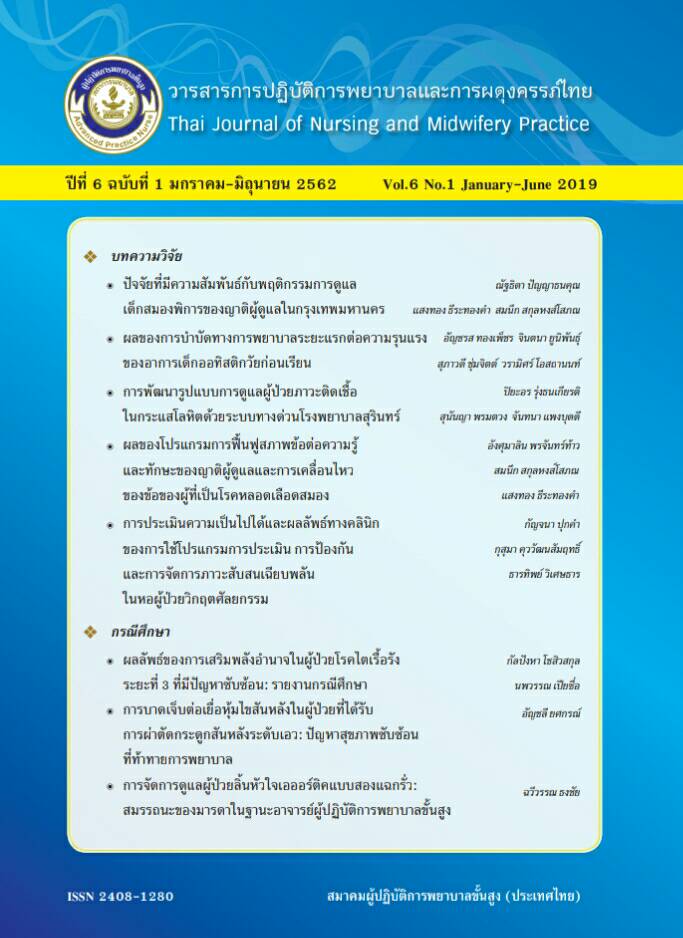Outcomes of Empowerment in Patient with Complex Chronic Kidney Disease Stage 3: A Case Report
Main Article Content
Abstract
Abstract: This case study presented empowerment by an advanced practice nurse in patients with complex chronic kidney disease stage 3 and its’ outcomes. Concept of empowerment was used to promote awareness and confidence in controlling factors affecting health and decision to choose corrected health behaviour practices which comprised of 4 steps: 1) Identifying real situation through assessment of behaviours, reviewing patient’s situation of inappropriate behaviours, and giving feedback on outcomes and clinical data; 2) Critical reflections by analysing the cause factors, enhancing health and media literacies, learning to read label of herbal medicine and documenting scientific evidences of steroid contamination; 3) Decision making on ways of practices by arranging knowledge exchanges and sharing using peritoneal dialysis case study, reflection, demonstration and return demonstration of insulin injection, and promoting of health behaviour changes; 4) Maintaining effective practices through telephone follow up, home visits, problem reviews, empowerments, and encouragements. Outcomes of empowerment process showed increasing of patient’s confidence in own capacity and ability of changing health behaviours continuously for 3 months. These influenced on clinical outcome improvement including: decreasing in systolic blood pressures, diastolic blood pressures, and glycocylated-haemoglobin levels, as well as increasing glumerulo filtration rates.
Downloads
Article Details
References
1.Luyckx VA,Tonelli M, Stanifer JW. The global burden of kidney disease and the sustainable development goals. Bull World Health Organ 2018;96(6):414-422.
2. International Society of Nephology. [Internet]. United States:2018 [cited 2019 Feb 22] Available from: https://www.era-edta.org/press/180626_ Prevalence_Data_Project.pdf
3. Ingsathit A, Thakkinstian A, Chaiprasert A, Sangthawan P, Gojaseni P, Kiattisunthorn K, Ongaiyooth L, Vanavanan S, Sirivongs D, Thirakhupt P, Mittal B, Singh AK. Prevalence and risk factors of chronic kidney disease in the Thai Adult Population: Thai SEEK Study. Nephrology Dialysis Transplantation. 2010; 25(5): 1567-75.
4. Suwannapet N. Perception of health status of continuous ambulatory peritoneal dialysis patients.
[dissertation]. Khon Kaen University ; 2010. (In Thai)
5. National Health Security Office. National Health Insurance Fund Management Handbook.No3
Management Patient Services of chronic kidney disease patients. Bangkok: Thanapat Limited;2015. (In Thai)
6. Sarakwan J, Boonkerd M, Meepaen M, Sittisongkram S, Khrabiad S. quality of life in patients with end stage of renal disease. Journal of Phrapokklao Nursing College 2017;28 (2):153-164. (In Thai)
7. Kidney Disease: Improving Global Outcomes (KDIGO) CKD Work Group. KDIGO 2017 Clinical practice guideline for the evaluation and management of chronic kidney disease. Kidney Int Suppl 2017;7(1):1-60.
8. Havas K, Douglas C, Bonner A. Person-centred care in chronic kidney disease: a cross-sectional study of patients’ desires for self-management support. BMC Nephrol 2017;18(1):17.
9. Narva AS, Norton JM, Boulware LE. Educating patients about CKD: The path to self-management and patient-centered care. Clin J Am Soc Nephrol 2015;11(4):694-703.
10. Nephrology Society of Thailand. Clinical practice recommendation for the evaluation and management of chronic kidney disease in adults. Bangkok;2015. (In Thai)
11.Johns TS, Yee J, Smith-Jules T, Campbell RC, Bauer C. Interdisciplinary care clinics in chronic kidney disease. BMC Nephrology 2015;16:161. doi:10.1186/s12882-015-0158-6.
12.Ounsrimuang K, Siriwatanamethanon J, Buatee S. Effects of Self–Management Program on Knowledge, Self–Management, and Health Indicators among Patients with Chronic Kidney Disease Stage 3. Journal of Nursing and Health Care.2013;31(2):91-9. (In Thai)
13. Gibson.CH. The process of empowerment in mothers of chronically ill children. Journal Advance Nurse. 1995;21:1201-10.
14. Varitsakul R. Strategies for Empowerment in Patients with Chronic Kidney Disease. Journal of Thai Red Cross.2017;10(1):1-12. (In Thai)
15. World Health Organization . (2018). Health Literacy and Health Behaviour [cited 2018 October 7] Avaiable from: https://www.who.int/health promotion/conferences/7gchp/track2/en/
16. Jiamjariyaporn T, Ingsathit A, Tungsanga, K, Banchuin C, Vipattawat K, Kanchanakorn S, Sitprija V. Effectiveness of integrated care on delaying chronic kidney disease progression in rural communities of Thailand (ESCORT study): rationale and design of the study [NCT01978951]. BMC Nephrology;2014;15(1): 1-7 .https://doi.org/10.1186/1471-2369-15-99.
17. Department of Medical Sciences. (2017). Steroid test kit in traditional medicine IC Technique. [cited 2018 Jun 12 ] Avaiable from : https://testkit.dmsc.moph.go.th/page-view/125. (In Thai)
18. Health System Research Institute. (2017). Systematic review of chronic care model and self-management support in chronic illness. [cited 2018 Jun 8]. Available from. https://kb.hsri.or.th/ dspace/handle/11228/4368?locale-attribute=th. (In Thai)
19. Serewiwattana M, Thongtanunam Y, Limakara S. Development of quality care for delaying progression of kidney disease in chronic patients using the chronic care model of a sub-district health promotion hospital. Thai Journal of Nursing and Midwifery Practice 2018; 5(1): 45-56. (In Thai)


